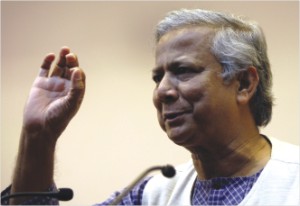
Inside
|
Breathing space for a new party? Are we witnessing the beginning of a new political re-alignment, asks Farid Bakht. And if so, what does this auger for the nation?
The democratic experiment is over. We could chant: "Democracy is dead. Long live techno-military government." In Bangkok, people power (actually wealthy middle-class urban) plus the revered king sent the politicians packing. In Dhaka, political rent-a-crowds caused chaos. There are no kings in Bangladesh, though one or two Western ambassadors seem eager to fill that role. So do we say this has been a modern Bengali coup, nothing like those of the bloody 70s? In many ways I hold contrarian views, whether in politics or in investments. This is another way of saying that I am not always right, though it is more interesting and painful! So I am at odds with the prevailing middle class view again. They seem to be relieved, relaxed, and hopeful. I would request the leading intellectuals who feel this way to please record their support. Some have already done so and it is, therefore, recorded for posterity. Once posted on the net, you can always be googled and can never deny your collaboration convincingly. In a few years, this will be important in sorting out the opportunists and collaborators from the progressives and true democrats. Right now, it does not matter. What do the intellectual fans of military democracy hope will happen? The sentimental Awami oriented ones may pine for something like this: The voter list will be patched up. Elections will be held this winter, if at all. The two main political parties will be arm twisted to participate. If they do not, expect some prominent leaders to face corruption charges and jail. This allows the erstwhile opposition alliance to win with a whopping majority. This is officially an alliance of the Awami League, Liberal Democratic Party, and Jatiyo Party. It really means that the three families of Mujib, B Chowdhury, and ex-General Ershad get the spoils. This may not be a popular outcome for all supporters of military democracy. After all by November 2007, they would have been living one year in a democracy-free country, or rather, Tareq-free. They would have got used to living without elected ministers. Why would they want the usual suspects back? Those not keen to see the Sheikh in power might therefore prefer another option. Professor Yunus seems to embody that feeling of something new and fresh, albeit at the tender age of 66 (which is young by Chinese standards). He is looking on from the sidelines, occasionally letting off a broadside against corrupt politicians, and propagating his version of a micro-credited economy thriving via a privately owned port. He is getting bolder (or more brazen) by the day. Apparently, he considers being president as being beneath him. It is rumoured that he will not be satisfied with anything less than prime ministerial power. Here we come to a dilemma. Lawyers know that justice must not only be done, it must be seen to be done. Thus, a transition to the "right" democratic regime has to be engineered. If the democratic project is to be revived, there has to a credible vote and electoral theatre. An interim government can only play for a certain amount of extra time. We are already beyond the stipulated time. There has to be a result in the end. It cannot continue ad-infinitum. The default option is for a ratcheted up national crisis (much worse than the one in January), to be followed by an open military regime, with day to day administration run by technocratic ministers. The difference from the situation today would be that it would be sanctified as a more or less permanent feature, rather than today's temporary (here today, gone tomorrow) façade. If this is the default scenario, what is the preferred scenario? We have established that the return of the two ladies is not it. The penny has not yet dropped amongst the older Awami League professional politicians. They still believe that the red carpet is being prepared for them. A new political party The ramshackle LDP could be easily renamed (again), or one or two could abandon that ship too. All in the national interest (remember the "rumours of a Third Force and national government" that used to circulate in 2004?). Islamist politicians would not be welcome. They would be on a sticky wicket, though I would not count them out. This new party would do well in the media circuit in Dhaka but suffer in the real world of rural Bangladesh. Would the army offer a protective shield against BNP-AL goons? Thousands of their cadres are already being held in custody, and we could expect many more to be threatened.
Fanciful? Of course, but then how many of you believed that an ex-World Bank employee backed by the military would be ruling today? Have we forgotten that the BNP and Jatiyo Party were created by military strongmen, utilizing state resources to attract politicians for hire? A new party would thus only be following the tradition of militarized politics. I wonder what it would be called. Notun . . . ? For some fearful Awami Leaguers, I must add that nothing is inevitable, but they had better come up with something resembling a strategy. Next time, we can ponder on the fate of the Awami League, a left over from the days of the British Empire and Pakistan. Farid Bakht is a political analyst. Photos: AFP |

 Do you think the embassies and aid agencies would salivate at the prospect? I am sure discussions are at an advanced stage.
Do you think the embassies and aid agencies would salivate at the prospect? I am sure discussions are at an advanced stage.